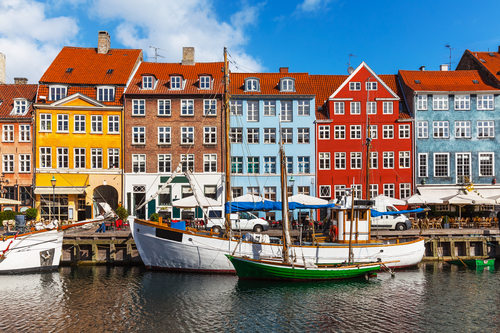Wander through an office building anywhere in the world at 5pm and you’re likely to find more than a few workers putting in the extra hours. In Japan for example, it’s almost taboo to leave your desk before the boss leaves theirs.Bosses in Denmark, however, are more likely to be chasing their staff out the door than insist they stay at their desks. In fact, it’s not unusual for Danish workers to start packing up for the day at 4pm. It’s therefore hardly surprising that expats in Denmark have voted the country the best place in the world for work-life balance.
The latest Expat Insider report lists the top 10 countries with family-positive working environments. Although the total hours worked in each country might not be that much lower than the global average, there are lots of small bonuses and helpful policies in place that carry the best performers to the top.
The differences are stark between Denmark and other developed nations such as the USA. Despite being the world’s top performing economy, America lags behind much smaller nations when measured on gender equality and average working hours. For example, Danish fathers are entitled to subsidised leave in order to take care of new babies. New parents are given a 52 week leave allowance, and can share 36 weeks of that leave between mum and dad in whichever way works for them. American parents, on the other hand, get no automatic entitlement to paid maternity leave, a factor cited as driving a decline in women in the workplace over the past 10 years.

In Denmark, almost 70 percent of women are in full-time work. As well as supportive maternity leave, women are helped with the return to work. All children under the age of seven are entitled to some form of daytime childcare, either in the home or at a kindergarten. Although not entirely free, this childcare is generously subsidised by up to 70 percent.
However, it’s not just family factors that Danes and expats in the country enjoy over their American counterparts. Danish workers put in 353 fewer hours than Americans every year. The Danish priority of family over work means that employers are usually accommodating and flexible when it comes to working hours.
Women work an average of 35 hours a week, compared to 41 hours for men, but this can include doing flexible hours or working from home as required. According to the OECD Better Life Report, only two percent of employees in Denmark work very long hours, compared to the OECD average of 13 percent.

Unlike in the US, it is highly irregular for bosses to ask employees to work late or over weekends. Most business negotiations take place over lunchtime, rather than keeping employees from going home for a family meal.
Even lunchtimes are ring-fenced, making it rare to see Danish people dining at their desks with one hand on a sandwich and the other on the keyboard. It’s not unusual for even the smallest businesses to provide a subsidised dining room or for co-workers to pitch in and share a communal meal.
Ensuring your staff are well fed and fuelled for an afternoon at their desks makes some business sense. However, insisting that they take five weeks of leave seems counterintuitive. Danish businesses are obliged to provide five weeks of paid leave, at a minimum, without counting public holidays. Three of these weeks can be taken back-to-back over the school holidays. That’s over and above national holidays. It’s not uncommon for businesses to close their doors for much of summer, so that employees can all enjoy time off at the same time. In comparison, workers in America have no minimum holiday entitlement, and according to Forbes, 38 percent of them get just 10 to 14 days, with only two percent enjoying anything close to Danish standards of leave.
You might be wondering how anything gets done in Denmark, with the country’s workers slacking off all the time. It turns out the opposite is true. The OECD report found that productivity actually dips significantly if workers push more than a 48-hour working week. Despite devoting 66 percent of the working day to personal care and leisure, compared to an average of just 62 percent across the OECD, workers in Denmark are the second most productive in Europe. Their productivity beats the long hours put in by desk jockeys in Australia, Canada, the USA and even workaholic Japan.

It’s not just the reduced working hours that give workers in Denmark more time to play. They also spend significantly less time travelling to and from work. With compact towns, a small population and great public transport, the average commute in the Greater Copenhagen area is 41 minutes by bike. Londoners, in contrast, endure 80 minutes crammed into miserable trains.
Although not strictly part of the work-life balance equation, workers in Denmark do not need to stress about health insurance being linked to their jobs. If you live in Denmark and pay Danish taxes, you are covered by the state-run healthcare system. There are no extra fees to pay and you will be covered for physician appointments, hospitalisation, medicines and treatment. Of course, this level of public service means higher taxes, with about half of the Danish public purse filled by direct taxation rather than just 25 percent in the US. However, Danish people don’t mind paying these extra levies, since they recognise the benefits they garner.
The work-life balance in Denmark is a result of some very Danish traits, with all parties trusting each other to deliver results as efficiently as they can and to play fair. The family has always been a prized part of life in the country, with it being widely accepted that work will always come second to the needs of loved ones.
It’s important for expats heading to Denmark to remember that they are unlikely to make a fortune in the country. Pay is not spectacularly high, but the taxes are.
“We probably spend our money differently,” says Christian Bjornskov, professor of Economics at Aarhus Business School. “Money is not as important in the social life here as, for example, Britain and America,” he told Denmark.dk. “We don’t buy big houses or big cars, we like to spend our money on socialising with others.”
Have you lived in Denmark? Share your experiences via the comments below, or answer the questions here to be featured in an interview!

